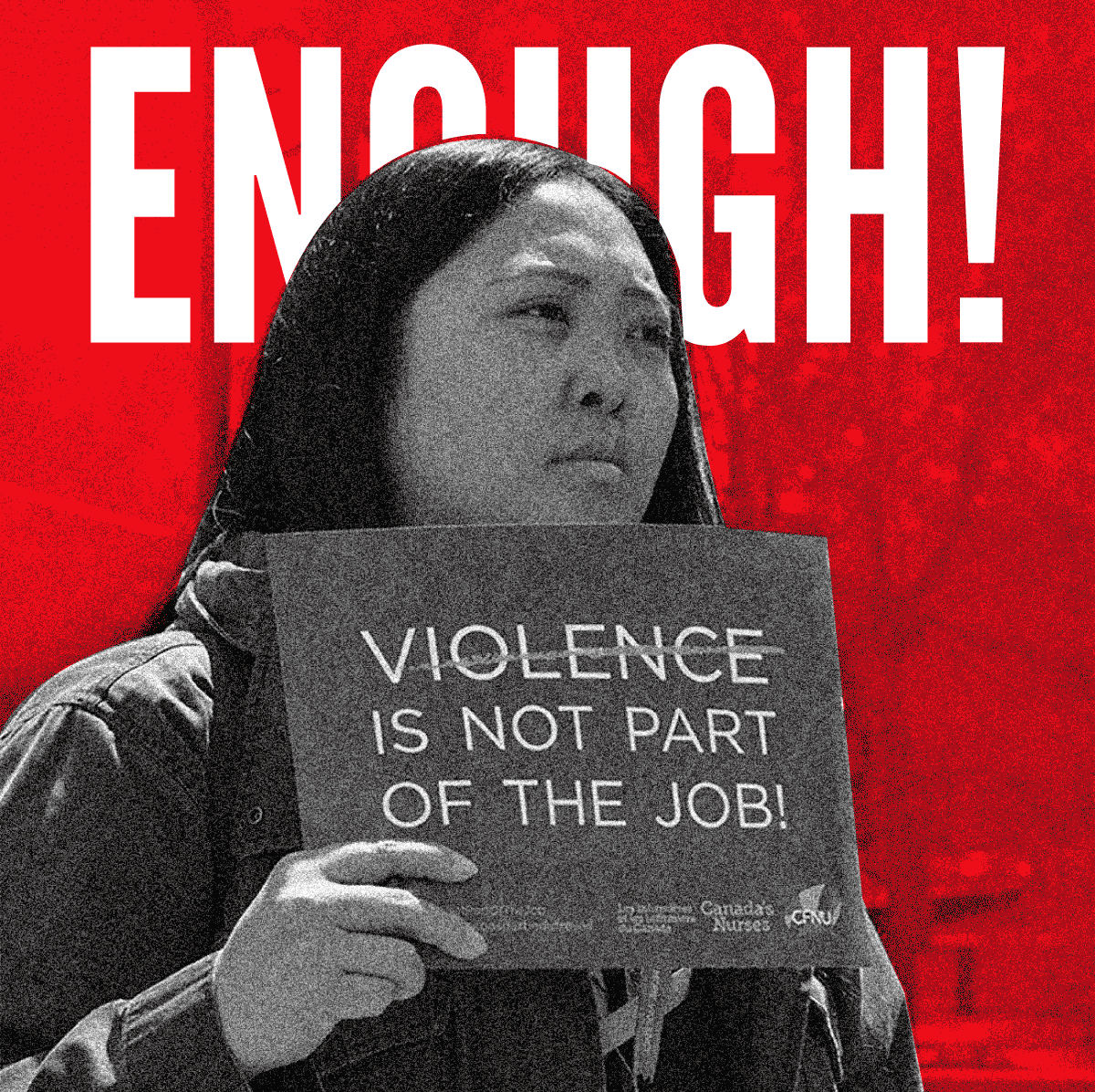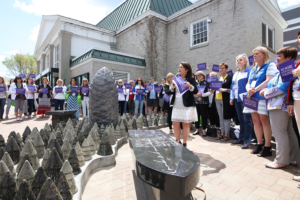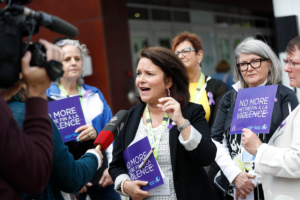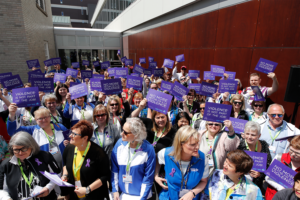
In a show of solidarity with nurses rallying in Moncton, the National Executive Board held a rally today calling on federal and provincial governments to take measures aimed at ending violence against health care workers.
“Violence against healthcare workers and especially nurses is increasing and becoming more severe,” said CFNU President Linda Silas. “This is a national problem that transcends provincial boundaries; all levels of government have a responsibility to take measures to protect health care workers in their workplaces.”
NBNU President Paula Doucet pointed to a slew of problems that have created a perfect storm of violence in New Brunswick’s health care sector.
“The decline in the number of workers, the increase of patient acuity, and weak security protocols have spurred the growth of unsafe work environments,” added Paula Doucet, NBNU President. “Nurses in New Brunswick are saying it loud and clear: violence is NOT part of the job.”
Nurses are being slapped, punched, kicked, knocked down, strangled and stabbed. Something has got to change – our nurses and their patients deserve better. In some cases, nurses have reached the point where they are having to sue the patients who strike them.
Violence in the workplace is unacceptable; the safety of frontline nurses and healthcare workers is non-negotiable. We need to ensure that the proper resources are available to treat potentially violence patients – that’s not being disputed. But we also need to implement common-sense security measures to protect nurses and create a safe environment conducive to quality patient care.
As our members know, the growing addictions crisis is making the situation even more dire. Nurses are treating an increasing number of patients who use meth and other highly dangerous substances; such drug use often leads to erratic and violent behaviour that places our nurses at risk. When governments consider the problem of violence in health care, they should look beyond the current pattern of violence and consider its root causes. Only then will we be able to implement the correct prevention and response tactics.
Nurses are calling for specific legal measures, such as support for Bill C-434, which would provide courts with the power to toughen sentences on those convicted of assaulting health care workers. They have also called for funding to address staffing shortages, strengthen security, improve training at health facilities, and gather more data on violence in the health care sector across Canada.
 |
 |
 |
If left unchecked, climate change is sure to have disastrous effects on our environment – and public health too. Nurses, however, are uniquely poised to take action and spur legislators to tackle the climate crisis head on.
That was the message that convention delegates took away from yesterday’s presentation on climate change and health, which coincided with the release of the CFNU’s highly anticipated discussion paper on climate change, Climate Change and Human Health: It’s time for nurses to act. The report outlines the scientific, human health and public policy implications of the global climate crisis and why nurses must use their voice to demand real action.
Delegates had the opportunity to hear directly from one of the report’s co-authors during yesterday’s plenary session. Wanda Martin (RN, PhD), a professor at the University of Saskatchewan’s College of Nursing, presented the paper’s findings and their implications for our future.
“It’s not just in places like Tanzania and Mozambique,” said Martin, whose field research in both countries examined the links between human health and climate change. “It’s important that nurses everywhere be prepared for the impacts of the climate crisis.”
Martin noted that Canada is among the least prepared countries in the world when it comes to climate action. The federal government’s Pan-Canadian Framework on Clean Growth and Climate Change still leaves many issues unaddressed to mitigate and adapt to the effects of climate change.
According to Martin, nurses have the power take direct action. The report highlights several areas where our members can make a difference. We invite you to consult pages 19 through 22 of the report for more complete details.
Nurses’ also have strong voices, as well as significant clout in their communities. Martin contends that nurses should think about getting involved in raising public awareness of the impacts of climate change on human health, and the need for action. And nurses shouldn’t feel intimidated: Martin pointed to some encouraging public polling data that places them at the top the list of most trusted professionals. As health care workers, we are well positioned to pressure politicians, who rank near the bottom in public opinion polling.
“Nurses are a trusted voice in health care,” concluded Martin. “We all can play a role.”
Why do we use the term “racialized persons” instead rather than “people of colour”? What does queer mean? What is cisgender? What is a pronoun and why do we use pronouns? What are land acknowledgements? What does it mean to be an ally?
Members who attended yesterday’s workshop on equity and inclusion came with questions, but also with a common goal in mind: working together to make our workplaces and unions more welcoming spaces where everyone can be themselves, feel accepted and thrive.
The workshop was led by Meera Chander, a legal consultant who helped the CFNU develop its Equity and Inclusion Toolkit (stay tuned: it’s being unveiled on Thursday!). The kit is a powerful tool aimed at helping member organizations and the CFNU promote greater inclusion and participation from equity-seeking groups. CFNU leaders were so impressed by the toolkit, they decided to expand it into a second format: Cards Against Inequity – a set of cards aimed at facilitating discussions about diversity and equity.
Participants in yesterday’s workshop were lucky to get a sneak peek! As they say, the proof is in the pudding; with the toolkit, cards and supportive facilitators by their side, delegates tackled some difficult topics.
“I hope this created a space for them where they’re a bit more comfortable having some of these harder conversations,” said Chander. “Some tough conversations took place here today, including discussions about privilege – and participants recognizing their own privilege.”
As Chander pointed out, it’s common to have participants get their guard up when discussing the idea of privilege. A person can look at their humble beginnings and reflect over the hardships they endured to get to where they are and – rightfully so – not feel very privileged. But that same person may not have experienced the kinds of hardships that are all too common in society that, wittingly or unwittingly, oppresses people of equity-seeking groups solely on the basis of their gender, race, sexual orientation, gender identity, gender expression or disability. A person with an Anglo-Saxon name, for example, will never experience having their resume thrown out simply because a recruiter assumed, from the applicant’s name alone, that they might lack language skills – something that racialized Canadians with non-Anglo-Saxon names experience regularly.
The toolkit and cards will help guide members through discussions like the ones that took place yesterday. In addition to creating more inclusive spaces for equity-seeking group, it’s our hope that these new tools can also empower our members to become stronger allies. For these members, Chander has some simple (and beautiful!) advice.
“Listen, have an open mind and have an open heart. When you’re from an equity-seeking group, all you want is to be seen and to be heard. If you go through life listening, having an open mind and having an open heart, you’ll achieve that.”
Approximately 50 nurses gathered yesterday for an all-day education session on Pharmacare and public health care. Speakers Melanie Benard and Amélie Baillargeon from the Canadian Health Coalition led the group through an in-depth analysis of Canada’s health care system. They also made the case for a universal, public pharmacare program, which would improve health outcomes and prove more cost-effective than our current patchwork system.
First on the agenda: debunking common myths about public and private health care. The facilitators revealed that only 70 per cent of the Canadian system is public. The other 30 per cent is private, due to prescription medication and other services falling outside our (not-so-public) health care system. By comparison, only 16 per cent of health care is private in the United Kingdom, where pharmaceuticals are covered by a comprehensive, public plan.
As a result of our patchwork system, Canadians are paying the third highest prices in the world for medication. There are over 100,000 drug plans in Canada, each one subject to different drug prices, as insurance providers negotiate with pharmaceutical companies. Most Canadians get coverage for private health services through plans offered by their employers; many plans do not provide full coverage, leaving countless Canadians to fill the gaps out-of-pocket or go without any coverage at all.
The facilitators also dispelled the notion that a ‘two-tier’ system can free up public resources and reduce wait times for key procedures. Participants discussed a case study from Saskatchewan, where private clinics operate under a 1-for-1 rule; in other words, for every scan performed by a private provider, the same provider must provide a free one of similar complexity to a Saskatchewanian on a public wait list. However, an Auditor General report found the rule did nothing to shorten wait lists. This serves as an important reminder that introducing private care does not improve care; in fact, it often ends up costing Canadians more.
Benard and Baillargeon explained what their organization, the Canadian Health Coalition, is doing to support equal access to public health care. Their mission is to protect and enhance the public portion of Canada’s health care system, noting that the best-available evidence shows that public systems deliver higher-quality outcomes than private ones. The Canadian Health Coalition has affiliates in every province, helping to advance shared objectives.
A key lesson from the workshop is that nurses must remain vigilant in opposing any effort to privatize health care or prevent the introduction of universal pharmacare in Canada. National standards are lacking, not only on pharmacare but also when it comes to long-term care, preventative care, and many other health care services. In order to protect and enhance our public system, it’s crucial that nurses get involved in campaigns. After all, they are the most trusted spokespeople in health care!
In the health care sector, violence is so prevalent, it has become normalized. Our culture has ignored and accepted violence as “part of the job”… But no more! Nurses are increasingly saying #EnoughIsEnough and unite against violence in the workplace. The question is: how do we put an end to violence in the workplace? How do we get people to listen?
The CFNU is advocating for safer workplaces on behalf of nurses across the country, but there is a great deal of work that needs to be done on the ground. Yesterday’s workshop, “Telling Our Stories: The realities of violence in our workplace,” gave members the tools and courage to speak up and speak out against violence in our workplace.
Facilitator, Dewey Funk (UNA) reminded participants of their legislated right to REFUSE to work in conditions they believe to dangerous or unsafe. Yet, few people invoke this right. Why? Because nurses view their patient as the most important person in their workplace; but during a potentially dangerous situation, the most important person needs to be YOU, the nurse!
Sitting idle and allowing violence to continue without speaking up – without holding employers accountable for our safety in the workplace -is not an option. Erna Bujna (ONA) shared stories of determination (and frustration!) in getting stronger OHS legislation passed in her province of Ontario. It wasn’t easy -and what exists today is by no means perfect -but by persevering, Ontario’s labour movement was able to improve safety legislation. The key to success? Report, report, report and DON’T STOP FIGHTING until you are protected.
Stressed? Add your voice to the first national nurse stress survey and help create change.